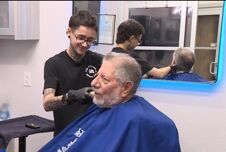Gay television producer and director Ryan Murphy talked about how his parents tried to subject him to conversion therapy the day after his prom when he was a junior in high school.
In an interview with The Hollywood Reporter, Murphy said that his newest film, The Prom – which follows a lesbian teen in Indiana who fights back after her school forbids her from bringing a female date to the school dance – had especial emotional resonance for him both because as a young person he never saw media images of gay people being accepted and because he felt so alienated during the three high school proms he attended.
Related: Proud dad Ryan Murphy tweets first photo of son Logan Phineas
“I went to my junior prom and the next day my parents took me to a psychiatrist to cure me,” Murphy said. “Thankfully, I had a really good shrink, who at the end of our several sessions called my parents in and said, ‘You have a choice here: You can try and change him and lose him, or you can accept him and love him.’ I was very blessed.”
Never Miss a Beat
Subscribe to our newsletter to stay ahead of the latest LGBTQ+ political news and insights.
Conversion therapy, which purports to change someone’s sexual orientation or gender identity, is a pseudoscientific form of psychological abuse which every major professional American mental health organization has disavowed as ineffective and harmful.
Despite his therapist’s words, Murphy said that he, like many other gay kids, wasn’t allowed to go to the prom as his true self, leaving him feeling like “a stranger in a strange land.”
“I know the feeling of being humiliated for your sexual preference. I know the feeling of thinking that you have no allies, and then it turns out you do,” Murphy said.
In the past, Murphy has talked about his own father beating him bloody with a belt after Murphy came out to him.
He incorporated a similar scene based on that experience into Pose, a TV drama about black and Latino queer ballroom performers during the height of the HIV epidemic in New York City.
“Every project that I’m drawn to has two things in it: an underdog and a makeover. I don’t know why,” Murphy told The Hollywood Reporter. “When you’re an artist sometimes you’re repeating a narrative that you, yourself, are trying to figure out. A lot of it, it’s my childhood. The thing that I wanted. How am I going to get out of there? Who do I want to work with? All of this is embedded in this piece for me.”














